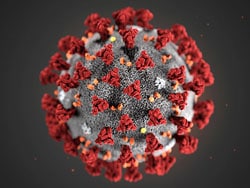Editor's note: Find the latest COVID-19 news and guidance in Medscape's Coronavirus Resource Center.
A new analysis of gene expression and protein content in lung and blood tissue suggests that certain variants of the ABO gene, which plays a central role in determining blood type, may also influence susceptibility to COVID-19. Researchers at the University of British Columbia analyzed data from three studies to link gene and protein expression in lungs and blood with genetic regions associated with COVID-19 susceptibility.

"These genes may also prove to be good markers for disease as well as potential drug targets," said lead author Ana Hernandez Cordero, PhD, postdoctoral fellow with the Center for Heart Lung Innovation, University of British Columbia, Vancouver, Canada, in a statement. Cordero presented the study at the American Thoracic Society (ATS) 2021 International Conference, which was held online.
Cordero noted that genome-wide association studies have been used to identify genetic regions associated with COVID-19 susceptibility, but they cannot be used to identify specific genes. To pinpoint genes, the researchers employed integrated genomics, which combines Bayesian co-localization summary-based Mendelian randomization and Mendelian randomization.
Searching for Candidate Genes
The researchers combined genetic data and transcriptomics data, which are a measurement of the messenger RNA produced in a cell. Messenger RNA is used as a blueprint for protein production. The genetics data came from the COVID-19 Host Genetics Initiative genome-wide association meta-analysis version 4 (patients with COVID-19 vs patients without COVID-19). Blood transcriptomics data came from the INTERVAL study (n = 3301), and lung transcriptomics data came from the Lung eQTL study (n = 1038). "From the integration of these three datasets we identified the candidate genes that are most likely to influence COVID-19 through gene expression. We further investigated the most consistent candidate genes and tested the causal association between their plasma protein levels and COVID-19 susceptibility using Bayesian co-localization and Mendelian randomization," said Cordero during her talk.
Susceptibility Drivers
The researchers identified six genes expressed in the lung and five expressed in blood that co-localized with COVID-19 susceptibility loci. They found that an increase in plasma levels of ABO was associated with greater risk for COVID-19 (Mendelian randomization P = .000025) and that expression of the SLC6A20 gene in the lung was also associated with higher COVID-19 risk. They also found novel associations at genes associated with respiratory diseases, such as asthma, as well as genes associated with the host immune responses, such as neutrophil and eosinophil counts.
Possibly Protective?
Within the ABO gene, the research also turned up evidence that blood type O may be protective against COVID-19. "The most significant variant used for the Mendelian randomization test was in complete linkage disagreement with the variant responsible for the blood type O genotype, conferring reduced risk," said Cordero.
The study's method is a powerful technique, said Jeremy Alexander Hirota, PhD, who was asked to comment. "The present study uses integrative omics to determine COVID-19 susceptibility factors which would have been challenging to identify with a single technology," said Hirota, who is an assistant professor of medicine at McMaster University, an adjunct professor of biology at the University of Waterloo, and an affiliate professor of medicine at the University of British Columbia. He trained with the senior author of the study but was not directly involved in the research.
The host response is widely believed to be most responsible for the symptoms of COVID-19, so it isn't surprising that host genes can be identified, according to Hirota. The identification of variants in the ABO protein is interesting, though. It suggests 'that systemic effects beyond respiratory mucosal immunity are a driver for susceptibility. To my understanding, ABO protein is not expressed in the respiratory mucosa, which is a common site of first contact for SARS-CoV-2. The links between blood ABO levels and initial infection of the respiratory mucosa by SARS-CoV-2 are unclear," he said.
Severity Link Needed
Hirota also said that although the study points toward associations with susceptibility to COVID-19, it isn't clear from the available data whether such associations are related to severity of disease. "If the [patients with gene variants] are more susceptible but [the disease is] less severe, then the results need to be interpreted accordingly. If the susceptibility is increased and the severity is also increased, maybe measured by increased risk for ICU admission, ventilator use, or mortality, then the work carries a much more important message. Future studies extending this work and integrating measures of severity are warranted to better understand the clinical utility of these findings for managing COVID-19 patients optimally," said Hirota.
It's also unclear whether the study populations are reflective of the populations that are currently at highest risk for COVID-19, such as residents of India, where the burden of disease is currently severe.
Cordero and Hirota have disclosed no relevant financial relationships.
American Thoracic Society (ATS) 2021 International Conference: Abstract A3765. Presented May 14, 2021.
For more news, follow Medscape on Facebook, Twitter, Instagram, and YouTube.
"type" - Google News
May 17, 2021 at 09:51PM
https://ift.tt/3hAAuki
Omics Analysis Links Blood Type to COVID-19 Medscape - Medscape
"type" - Google News
https://ift.tt/2WhN8Zg
https://ift.tt/2YrjQdq
Bagikan Berita Ini














0 Response to "Omics Analysis Links Blood Type to COVID-19 Medscape - Medscape"
Post a Comment